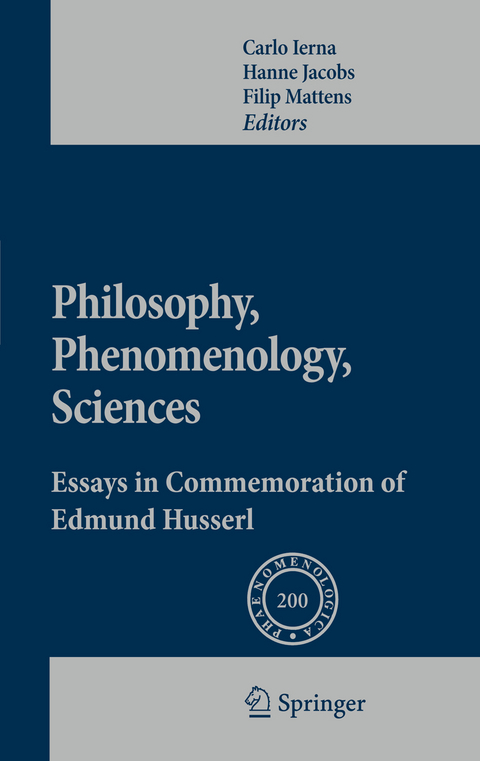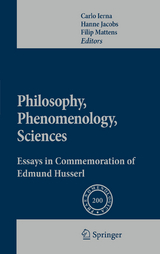Philosophy, Phenomenology, Sciences
The present volume contains many of the papers presented at a four-day conference held by the Husserl-Archives in Leuven in April 2009 to c- memorate the one hundred and ?ftieth anniversary of Edmund Husserl’s birth. The conference was organized to facilitate the critical evaluation of Husserl’s philosophical project from various perspectives and in light of the current philosophical and scienti?c climate. Still today, the characteristic tension between Husserl’s concrete and detailed descriptions of consciousness, on the one hand, and his radical philosophical claim to ultimate truth and certainty in thinking, feeling, and acting, on the other, calls for a sustained re?ection on the relation between a Husserlian phenomenological philosophy and philosophy in general. What can phenomenological re?ection contribute to the ongoing discussion of certain perennial philosophical questions and which phi- sophical problems are raised by a phenomenological philosophy itself? In addition to addressing the question of the relation between p- nomenology and philosophy in general, phenomenology today cannot avoid addressing the nature of its relation to the methods and results of the natural and human sciences. In fact, for Husserl, phenomenology is not just one among many philosophical methods and entirely unrelated to the sciences. Rather, according to Husserl, phenomenology should be a “?rst philosophy” and should aim to become the standard for all true science.
Carlo Ierna is Postdoctoral Fellow of the Research Foundation Flanders (FWO) and is currently working at the Husserl-Archives Leuven. He has a Master's degree both in Philosophy and in Cognitive Artificial Intelligence from Utrecht University. He obtained his PhD in Philosophy from the Katholieke Universiteit Leuven. His research interests include the history and philosophy of logic and mathematics in the 19th and early 20th century. In particular, his recent work focuses on Husserl’s early works and the school of Brentano. Hanne Jacobs is Assistant Professor of Philosophy at Loyola University Chicago. She obtained her PhD from the Katholieke Universiteit Leuven. Her research interests are in phenomenology and modern philosophy. Filip Mattens studied architecture and philosophy. Currently, he is a Postdoctoral Fellow of the Research Foundation Flanders (FWO), affiliated with the Institute of Philosophy at the Katholieke Universiteit Leuven. His work focuses on philosophical issues concerning perception, space, and sensory experience. Further research interests include the relation between modernity, imagination, and the aesthetics of space.
The Nature and Method of Phenomenology.- Husserl on First Philosophy.- Le sens de la phénoménologie.- Transzendentale Phänomenologie?.- Husserl and the ‘absolute’.- Husserls Beweis für den transzendentalen Idealismus.- Phenomenology as First Philosophy: A Prehistory.- Der methodologische Transzendentalismus der Phänomenologie.- Phenomenology and the Sciences.- Husserl contra Carnap : la démarcation des sciences.- Phänomenologische Methoden und empirische Erkenntnisse.- Descriptive Psychology and Natural Sciences: Husserl’s early Criticism of Brentano.- Mathesis universalis et géométrie : Husserl et Grassmann.- Phenomenology and Consciousness.- Tamino’s Eyes, Pamina’s Gaze: Husserl’s Phenomenology of Image-Consciousness Refashioned.- Towards a Phenomenological Account of Personal Identity.- Husserl’s Subjectivism: The “thoroughly peculiar ‘forms’” of Consciousness and the Philosophy of Mind*.- “So You Want to Naturalize Consciousness?” “Why, why not?” – “But How?” Husserl meeting some offspring.- Philosophy and ‘Experience’: A Conflict of Interests?*.- Phenomenology and Practical Philosophy.- Self-Responsibility and Eudaimonia.- Möglichkeiten und Grenzen einer phänomenologischen Theorie des Handelns: Überlegungen zu Davidson und Husserl.- Husserl und das Faktum der praktischen Vernunft: Anstoß und Herausforderung einer phänomenologischen Ethik der Person.- Erde und Leib: Ort der Ökologie nach Husserl.- Reality and Ideality.- The Universal as “What is in Common”: Comments on the Proton-Pseudos in Husserl’s Doctrine of the Intuition of Essence*.- Die Kulturbedeutung der Intentionalität: Zu Husserls Wirklichkeitsbegriff.- La partition du réel : Remarques sur l’eidos, la phantasia, l’effondrement du monde etl’être absolu de la conscience.- Husserl’s Mereological Argument for Intentional Constitution.- Phenomenology in a different voice: Husserl and Nishida in the 1930s.- Thinking about Non-Existence*.- Gott in Edmund Husserls Phänomenologie.
| Reihe/Serie | Phaenomenologica ; 200 |
|---|---|
| Zusatzinfo | XIV, 738 p. |
| Verlagsort | Dordrecht |
| Sprache | englisch |
| Maße | 155 x 235 mm |
| Themenwelt | Geisteswissenschaften ► Philosophie ► Philosophie der Neuzeit |
| ISBN-10 | 94-007-0070-9 / 9400700709 |
| ISBN-13 | 978-94-007-0070-3 / 9789400700703 |
| Zustand | Neuware |
| Haben Sie eine Frage zum Produkt? |
aus dem Bereich




